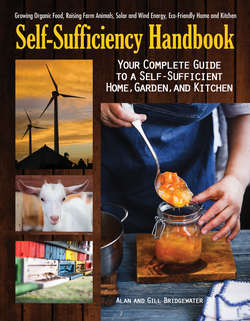Читать книгу The Self-Sufficiency Handbook - Alan Bridgewater - Страница 51
На сайте Литреса книга снята с продажи.
The Clivus System
ОглавлениеThe Clivus (pronounced “CLEAVE-us”) is a fiber-and-plastic box, about the size of a small room, that is fitted with pipes: two large pipes going up (one up to the toilet and the other up to the kitchen), sometimes another smaller pipe going to another sink, and a large pipe or flue going up and out at roof level. You use the toilet or work in the kitchen and drop scraps of waste down a hatch. Either way, the waste falls into the enclosed container, where it gradually breaks down. It’s very much like my grandfather’s hole-in-the-ground scenario; after a year or two, you can shovel out the most beautiful compost.
• Does it smell? No, for the most part. The downdraft from the toilet is so strong that the smells are drawn down from the kitchen and toilet and sent up the chimney.
• Is it safe? Yes. The process is such that the resultant compost is perfectly safe and user-friendly.
• Does the compost look like excrement? No. It breaks down to a fine, friable, golden-brown tilth that is good enough to spread on the garden.
• Does the process need water? No more than you would expect to get from urine and kitchen waste.
• Can it be installed anywhere? No. Because you need to have easy access to the emptying hatch, it needs to be installed in a basement, in a split-level house on a sloping site, or downstairs in a two-story house in which the kitchen and toilet are upstairs.
• Are there any problems? Yes. Flies like the smell, but the company has made design modifications, such as the addition of extractor fans to increase the updraft and discourage the flies.
• What happens to the gray water from the house? You can either put it down the public sewer or, if space allows, drain it off into the garden.
